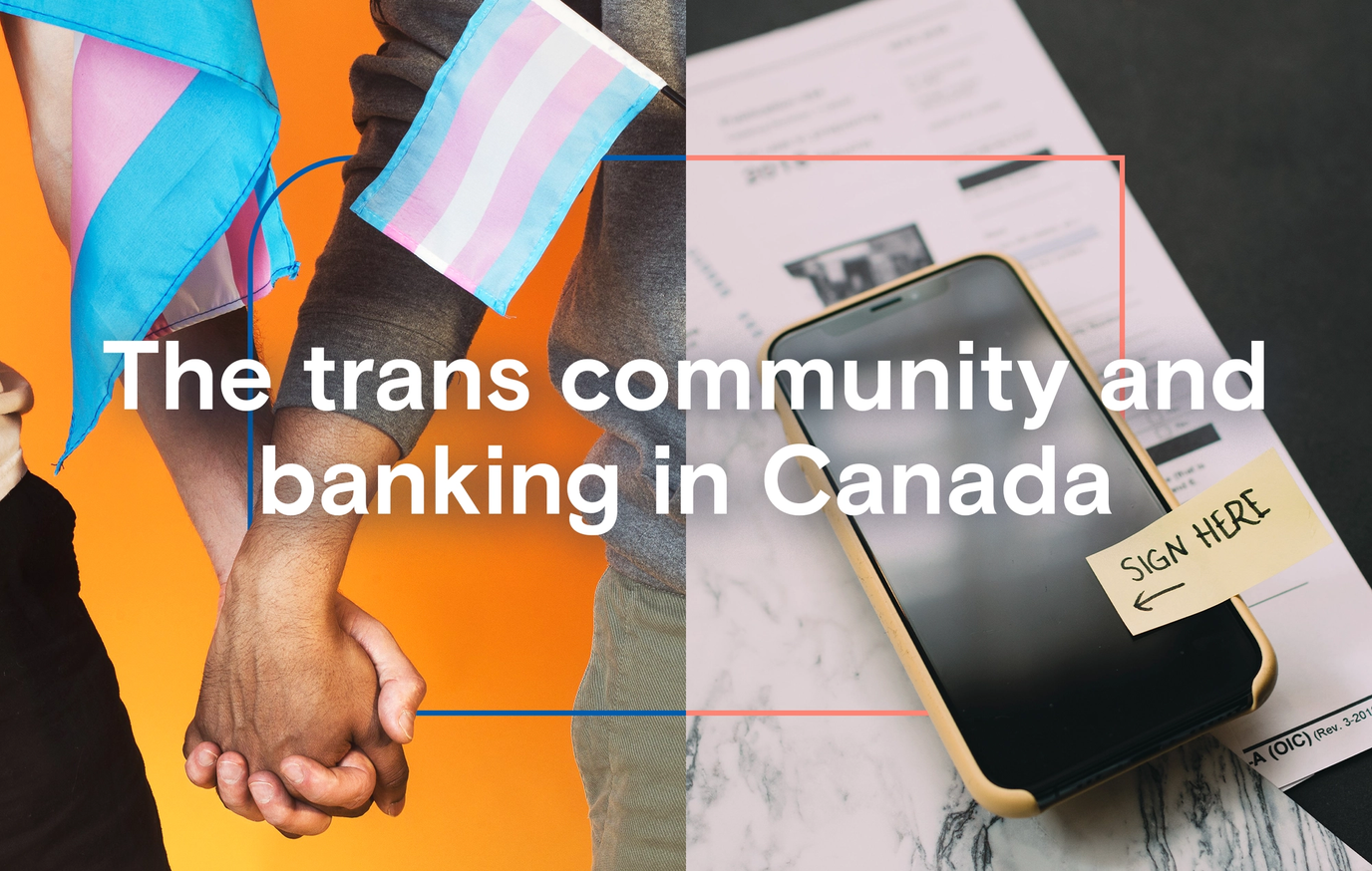Back
The trans community and banking in Canada: A call-to-arms for reform
6 min read

Written By
Laura Inostroza
Rounding it up
Financial institutions often add a layer of complication for trans folx who are already making a huge decision in their lives.
For example, it costs $137 to legally change your name in Canada, which can be an exorbitant cost for those living paycheque to paycheque.
Changing your name also means you’ll have to either drop the credit history under your assigned name, or give creditors access to private information about your identity.
In light of these barriers, many have opted for fintechs with more flexible policies. But there is still room for our financial ecosystem to better support our trans community.
What’s in a name?
If you have ever changed your legal name in Canada, you know that the process costs $137. Why would someone change their legal name? In most cases, a cisgender person would need to do this after marriage or divorce. For a transgender person, however, this is often the first step to feeling comfortable and validated in their existence.
Cisgender, or simply cis, describes a person whose gender identity aligns with the sex they were assigned at birth. If you are cisgender and heterosexual, you make up 96% of the population of Canada. However, an estimated 75,000, or 0.24%, of Canadians aged 15 and older are transgender. This number comprises anyone whose reported sex assigned at birth differs from their current gender, including those who are non-binary, or those whose gender falls outside the binary of man/woman.
"It is not the same process as changing your last name when you get married. There is bizarrely a separate set of rules for when you are changing your name in marriage versus changing your name for any other reason. And it's more difficult in the latter," says Rodrigo Heng-Lehtinen, deputy executive director of the National Center for Transgender Equality.
A $137 fee to make a legal change to display your true name on your bank cards can be an exorbitant cost for people living paycheque to paycheque — a group that overwhelmingly includes trans and non-binary people. After all, it is unfortunately all too common to lose work after transitioning; 13% of respondents to the Trans PULSE Survey reported getting fired for being trans, and only 37% of trans people surveyed held a full-time job — Add that to the fact that half of the transgender population earned $15,000 or less per year between 2009 and 2010. After adjusting for inflation, this amount is still only $18,142.24, which falls below Canada’s 2015 Official Poverty Line.
This sobering reality means that some of the most vulnerable members of our population often have to rely on borrowing funds to change their name, be it from friends, their disability pension, welfare or employment insurance. “I've sent money to Trans friends just for a name change” says Kat, a trans woman living in Ottawa.
You can bank on bureaucracy
While the process of transitioning does not begin as a bureaucratic one, it often ends up there as the many changes snowball into one another. “You have to change your name on all of your financial accounts at once otherwise your money is locked,” says Robin, another trans woman from Toronto. For people like Robin, this can mean changing your name with multiple organizations. “For me this included a crypto [account], CIBC, Wealthsimple and KOHO,” she confirmed.
Concerns may also arise for trans residents who are asked to pay rent through physical cheques. For example, Robin was worried that the cheques she’d be giving her landlord wouldn’t match the name on her lease, “but luckily the timing worked out and I was able to change my name [on my bank account] right before I ordered them.”
Moving away from cheques and other paper-format banking is certainly a way to improve this situation. However, many landlords prefer the security a cheque offers and are unwilling to change to means like e-Transfer, which puts greater power in the tenant’s hands.
"A $137 fee to make a legal change to display your true name on your bank cards can be an exorbitant cost for people living paycheque to paycheque — a group that overwhelmingly includes trans and non-binary people."
How the banking revolution could assist the trans community
The ecosystem for Peer to Peer (P2P) apps in Canada is in need of innovation and ripe for disruption. In the U.S., companies such as Paypal’s subsidiary Venmo and Stripe’s Cash App have begun to dominate the P2P space, even becoming some users’ primary financial account. As a result, some landlords accept rent payments using these methods. This could stem from the fact that users feel secure with these apps and feel that they are able to recover any funds sent to the wrong person. In reality, however, these apps have very little recourse to ensure payments are made to the correct person. Claims to recover your money are often covered by the app company themselves or rejected altogether — making them no less secure than cash exchanges.
In Canada, we have a similar network of P2P money exchange with Interac’s e-Transfers, but in our case, they are connected to the existing financial ecosystem. Most Canadians think of Interac as an extension of their bank’s offerings and hold the bank accountable for any issues with these transfers, as opposed to Interac themselves. With this vital P2P network strapped to existing banks, communities such as trans folx are continuously marginalized.
It’s almost easy to conclude that a payment app independent of banks, that allows one to reliably send payments under their true name, would do quite well in Canada.
The fact that the archaic financial ecosystem does not serve them well can explain why people opt for fintechs. These often accept digital documentation to sign up, rather than a physical visit. For example, U.S. residents have access to the Daylight app. Specifically designed for the LGBTQIA2S+ community, this fintech prints the user’s chosen name, rather than a legal name, on their card. Up north, we have KOHO, which is working to print a user’s chosen name on their prepaid Mastercard. With a significant 13% of the Canadian population belonging to the LGBTQ+ community, we must work to design financial experiences tailored to their needs and preferences.
Credit checks without the addition of trauma
Another appealing quality of emerging financial services is that you can sign up without a formal credit check. This is valuable, because if you are a trans person legally changing your name, you’ll either have to drop the credit history you’ve built under your assigned name, or give every creditor access to private information about your identity. “I’ve asked to have [my previous name] removed but it causes a headache with paperwork, it’s like I didn’t exist before 2016” says Cam, a trans man whose transition was formalized that same year.
This can create issues for people looking to borrow money in a landscape that erases credit history but doesn't cover many gender confirmation surgeries under provincial health care plans. Top surgery is a procedure that OHIP covers for Ontarians, but the waitlist is currently 2 years long, prompting many people to pay $8,000 out of pocket. Other procedures like facial feminization surgeries, are not covered by any plan and can cost anywhere between $20,000 and $50,000, depending on the surgeon and the number of component procedures performed. Kat stated, “if a bank had a ‘trans surgery loan’ policy I would switch [to them]”.
Advice you can bank on
If you are a queer person looking for financial advice, it can be hard to find tailored advice which considers the financial burdens you may face. Fortunately, we have trailblazers like Gaby Dunn, who wrote her book, Bad With Money: The Imperfect Art of Getting Your Financial Sh*t Together, through a queer-centric lens. The Debt Free Guys also make a podcast called Queer Money, with episodes like The Economics of Being Trans. WNYC Studios’ podcast Nancy presented a full podcast season called Queer Money Matters, covering a range of informative topics.
The trans community is well-versed in the many hoops they often have to jump through to do everyday things, such as sign up for a new credit card or provide cheques as a method of payment. However, we as cis Canadians would do well to educate ourselves in the ways we can help the trans community. So we’re calling all enterprising young app creators ready for a new project, or lawmakers and legislators looking to find a cause to support. Let’s create a banking and legal landscape that better supports our transgender neighbours, starting with democratizing name changes and credit checks. Because everyone deserves to be in control of their identity and their finances — period.

About the author
A queer person working in Tech, Laura brings a blend of empathy and education in psychology to her life as a Support professional. As someone who takes the role of thought-leader whenever possible, Laura works in the accessibility space and maintains a passion for diversity, equity and inclusion.
Read more about this author